Discover The Dipping Sauce Culture in Vietnam: Fish Sauce and More (Recipes Included)
Vietnamese cuisine is one of the best cuisines in the world. There are many factors that help define the tastiness of Vietnamese dishes, the most essential factor among them is the dipping sauce. Without dipping sauce, the amazing dishes that represent our culture, spring rolls, for instance, aren’t as enjoyable.
It’s surprising to know that there are more than 20 different kinds of dipping sauce in Vietnam: originally Vietnam made, inspired by other countries, or adjustments of existing sauces. Each kind of sauce matches with very specific types of food, and vice versa; a specific type of food goes with its known sauces. Along with the difference in regional cuisines, these factors have made dipping sauce culture in Vietnamese cuisine one of the most impressive and sometimes, the most complex thing to understand. Given that fact, this article is here to help you grow your knowledge about Vietnamese dipping sauce. I will cover information about fish sauce and a list of 11 different dipping sauces, divided into the three regions of Vietnam, recipes included.
I. Fish sauce – the national sauce
The first thing that pops up into my head when someone talks about dipping sauce in Vietnam is always fish sauce. In Vietnamese, we call it nuoc mam. In my opinion, fish sauce is our national sauce. If you ask me what it is, I guess you are a vegetarian or, you haven’t tried any Vietnamese food, yet. A typical Vietnamese meal always has fish sauce in it, whether as the dipping sauce or as a replacement for salt when seasoning the food.
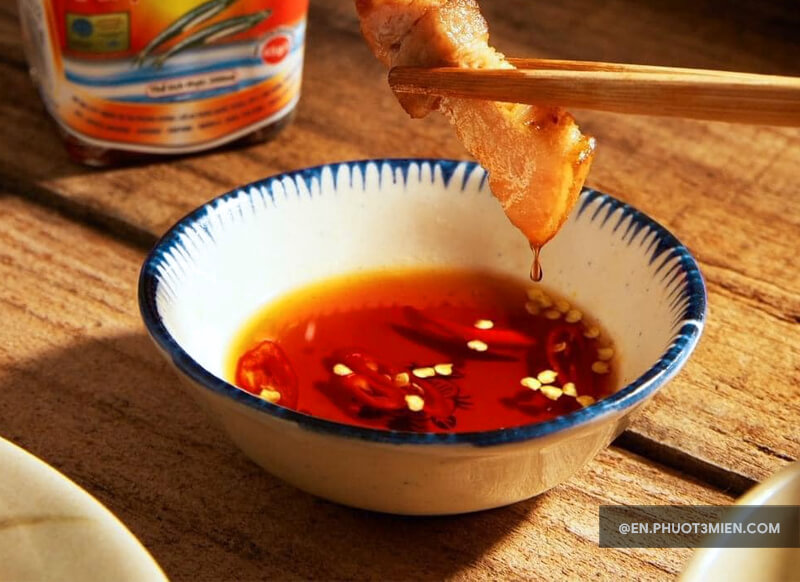
How to make fish sauce
You know it’s called fish sauce, but do you see any sign of fish in the sauce? So how is fish sauce made? All you have to do is coat fish in salt, and ferment it up to one or two years. That said, the ingredients are very simple, just fish and a lot of salt with a proper container. If you want to add some extra good flavors to it, you can add pineapple, honey, or sugar water. I’ve prepared some tips to make a really good self-made fish sauce.
- I suggest using anchovy as the fish. October until December is the peak time of the year when anchovy fish is rich in nutrition and plenty in quality and quantity.
- The golden ratio is 4 to 1 to 1: 4 fish, 1 salt, and 1 pineapple (if you are adding pineapple). Mix these well together and pour over a layer of stones in the bottom of the container. These stones work as a filter that removes the sediment.
- Use terracotta containers. It helps the fish ferment faster and better than using plastic or cement containers. Make sure you install a water tap so you can easily extract the sauce when it’s done.
- This is optional. If you want it to break down faster and better, frequently open the container twice a month and stir it.
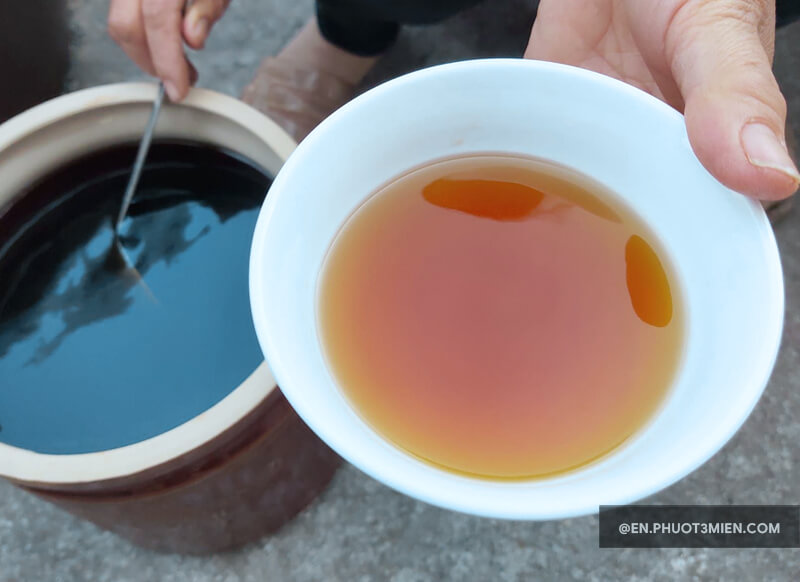
After a year or two, you know the sauce is ready to enjoy when the extracted liquid is brown-ish (like a cockroach wing color) or yellow like straw.
Regional recipe to mix a good fish sauce
With one bottle of original fish sauce, we can create different kinds of dipping fish sauce with different tastes. I will introduce five classic Vietnamese dipping sauces using fish sauce from three regions of Vietnam.
1/ The Northern Recipe
The Northern Vietnamese like to eat less sweet and less salty dishes and they love lemon.
Ingredients: Fish sauce, sugar, lemon, chili pepper, garlic, lemon leaves (optional)
How to make it: First, mix two coffee spoons of warm water with one coffee spoon of sugar. Then, mix in one big spoon of original fish sauce, a quarter of a lemon with minced garlic, sliced chili, and lemon leaves. That’s it!
Dishes to try it with: By adding more water and sugar or more fish sauce, you can customize this recipe for bun cha, or fried spring rolls.
2/ Central Vietnam Recipe
Dishes from central Vietnam are always spicy and tend to be saltier, same goes for the dipping sauce. You will even see that this area uses pure fish sauce with just some chili pepper for the dipping sauce.
Ingredients: Fish sauce, sugar, chili pepper
How to make it: First, mix two big spoons of fish sauce with one or even half of a spoon of sugar. Smash the chili pepper and put it in the fish sauce.
KKday is a travel APP platform offering over 20,000+ online products such as: tickets for amusement parks, outdoor services, sightseeing tours, culinary experiences, transportation, accommodation, courses, and local culture... Currently, there is a summer promotion with discounts up to 50% and coupons up to 250K VND off.

Attractive discount codes such as: 100K VND off for new accounts, 150K VND off summer promotion, 250K VND off, KKday birthday celebration...
Dishes to try it with: Everything! This fish sauce mix is a must-have in a common meal in the central area. You can use it with rice or steamed veggies etc. Add some ginger, and it’s ready for boiled beef. If you add some dill leaves, fried fish is the dish to try it with.
3/ The Southern Recipe
Southerners like it sweet. You may find that they put sugar in everything, and of course, in their dipping sauces.
Recipe: Garlic and chili pepper fish sauce mix
Ingredients: Fish sauce, garlic, chili pepper, lemon, sugar
How to make it: This mix has similar ingredients to the Northern recipe, but with a totally different ratio of water, sugar, and fish sauce. You will mix three coffee spoons of water with three coffee spoons of sugar and then add two big spoons of fish sauce. Add in 2/3 juice of a lemon, minced garlic, and chili pepper.
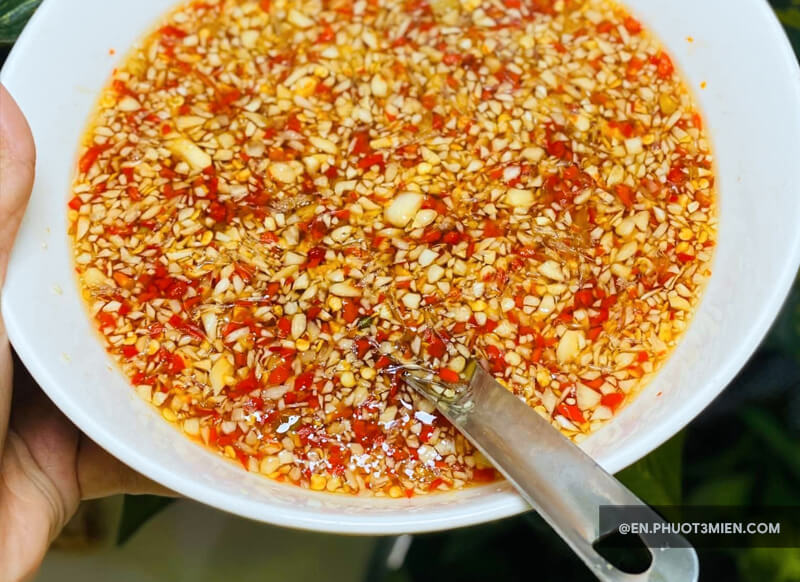
Fish sauce is an essential part in every Vietnamese meals
Dishes to try it with: Vietnamese sizzling cake (banh xeo) and Vietnamese mini pancake (banh khot). You can add pickles to the sauce to make it more flavorful, and it becomes a nice dipping sauce for spring rolls.
Vegetarian dipping sauce recipe for fish sauce
What about the vegetarians? Can you make a vegetarian version of fish sauce? Yes!
Ingredients: pineapple, sugar, colored sugar syrup, salt, water, soy sauce
How to make it: Mince pineapple with a knife and then boil it with water, sugar, salt, and soy sauce for one hour. If you see bubbles on the surface while boiling, use the spoon to take them out to make sure the end product looks clean. When you are done, pour this mixture through a cotton fabric into a bowl to filter out the impurities. Boil the liquid one more time and it’s good to go.
II. Vietnamese dipping sauce by region
Forget about fish sauce and let’s get back to our main topic, the dipping sauce. Vietnamese food varies from North to South, and dipping sauce is a part of that variation. One dish can pair with different sauces when you are eating it in different parts of the country. Let’s explore!
1. North Vietnam
Fermented shrimp paste – Mam tom
Fermented shrimp paste made its way on this list because, together with tofu and rice vermicelli, they make a good combo. This combo is called bun dau mam tom (Vietnamese fermented shrimp paste noodle). It’s considered one of the smelliest dishes in Vietnam. But it is my favorite dish! Like fish sauce, shrimp sauce is a condiment made of shrimp and salt, fermented for several weeks. Besides the typical fish sauce mix of the North, shrimp paste is another Vietnamese sauce enjoyed with pork, boiled pork specifically. Original shrimp paste is quite salty. Normally you need to add sugar, kumquat, and boiling oil to the sauce. These additions make it much tastier.
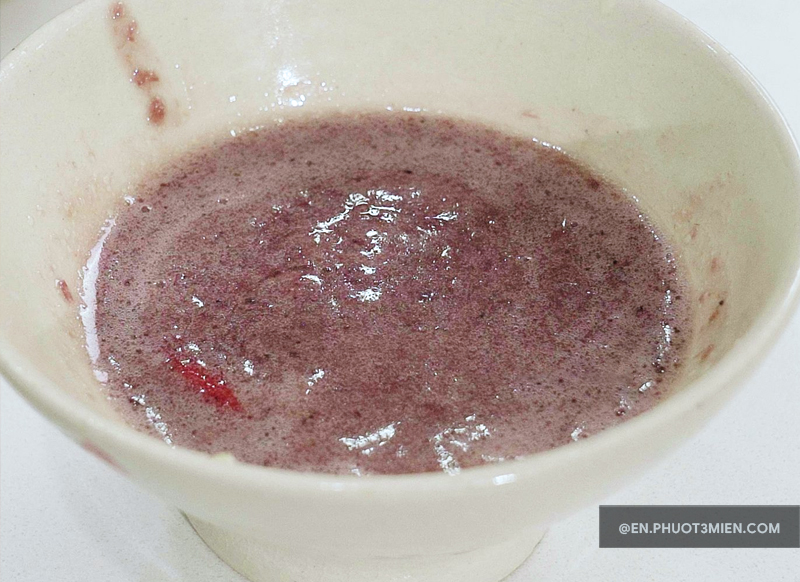
Salt with pepper and lemon leaves – Muoi tieu chanh
This is a very simple mix but it creates a very tasty dipping sauce. A bit of salt, a bit of ground pepper, sliced lemon leaves, and some lemon juice are all you need. Stir these ingredients together and you will have the most powerful sauce. Whether it is boiled chicken, pork or seafood, it can be paired with this sauce to make a great combo.
2. Central Vietnam
Green sauce – Muoi tieu xanh
This green sauce and how it is made is always a mystery to travelers who have visited Nha Trang. Now it’s no longer a secret, you are about to find out what’s in it.
Green sauce recipe:
Ingredients:
- 7 grams of sugar
- 1 lemon
- 2 grams of green chili pepper
- 1 gram of pure salt
- Lemon leaves
How to make Nha Trang’s green sauce:
Clean the chili pepper, remove all the seeds and leave it until it’s dry. When it’s dried out, blend the salt, chili pepper, and lemon leaves together. When the two ingredients are well blended, pour some pure lemon juice into the mixture and blend it for five more seconds. That final step is what makes all the difference. Your green sauce is ready! Green sauce goes very well with seafood, together they make a mind-blowing taste in your mouth.
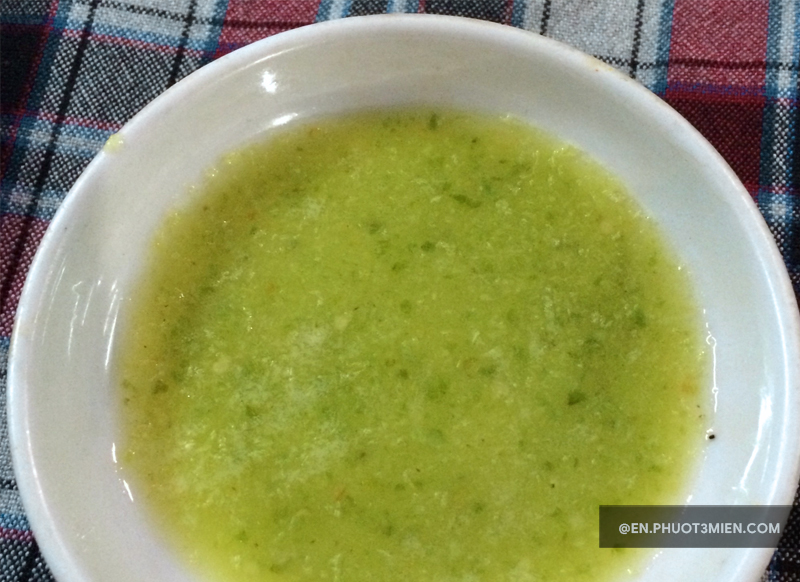
Fermented fish paste – Mam nem
Mam nem is made by fermenting fish. Unlike fish sauce, this kind of sauce is more condensed, and it looks like shrimp paste. In central Vietnam, it rains and storms for three continuous months. Markets can’t often operate to provide food. This fermented fish paste is considered a reservable food that can be eaten with rice during the rainy season.
Similar to fish sauce, to make this fermented fish paste you just need to prepare salt and fish and mix them together. However, it takes only three months to prepare this sauce instead of one or two years.
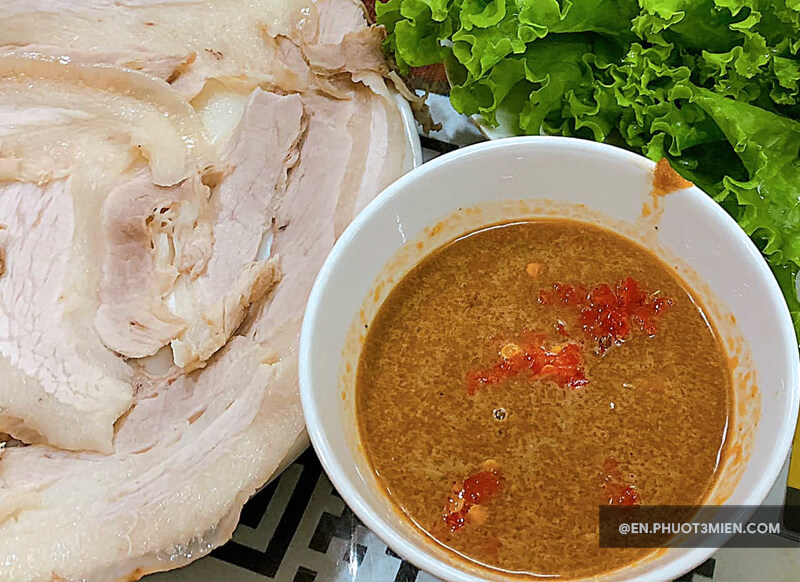
The sauce itself is a bit too strong. It’s normally mixed with additional ingredients in order to make a perfect dipping sauce. Those additions are minced pineapple, garlic, onion, and chili pepper. Stir fry this additional mixture then add the pure fish paste in with a little water and boil it. You can use sugar if you think it’s too salty.
The mam nem dipping sauce plays a very important part in creating a unique cuisine in central Vietnam, especially, Da Nang cuisine. You can find many different dishes here using this same sauce. It is said that whatever dish is made from rice powder can make friends with mam nem. Some typical dishes you should try with mam nem are banh trang cuon thit heo (pork rolled in rice paper), asking cake with pork intestine (banh hoi long heo), and steamed rice paper (banh uot mam nem). Mam nem is a great pick among those Vietnamese dipping sauces for rice paper rolls, even though it’s more of a Southern food.
Peanut sauce
If the unique smell of mam nem can’t keep your love, peanut sauce will. It is another great dipping sauce for spring rolls or rice paper rolls. There are more than two ways to make peanut sauce. It’s base can be peanut butter or raw peanuts, with different additional ingredients. My favorite recipe uses raw peanuts.
Peanut sauce recipe:
Ingredient:
- Hoisin sauce
- Minced garlic, scallion
- Sugar, salt, ground pepper
- Coconut juice
- Raw peeled peanut
- Tapioca flour
How to make it: Stir-fry minced garlic and scallions with pounded raw peanut until they blend into each other and you can smell the peanut flavor. Add coconut juice into the mixture and boil it. Mix the tapioca flour with water and sugar, then pour this new fluid into the pan. Stir the mixture, when you see that it’s more condensed, add hoisin sauce and ground pepper. It’s ready. You can add peanut butter in the final step for a stronger peanut taste.
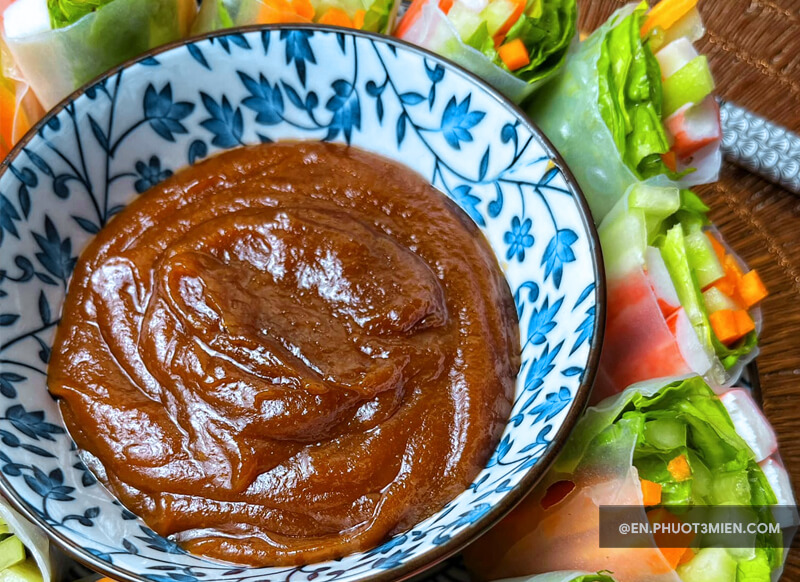
This peanut sauce can go with many different kinds of food: boiled veggies, spring rolls, and sizzling cake (banh xeo). Add some chili satay and then it’s great for grilled pork as well.
3. South Vietnam
Tamarind sauce – Mam me
The North has shrimp paste to compliment boiled pork and intestine. Seafood is married to the green sauce in Central Vietnam. Which dipping sauce represents the South? I say tamarind sauce. Nowhere in Vietnam, can you find better tamarind sauce than in southern cities. This naturally sweet and sour tamarind mixed with the unique saltiness from fish sauce, adds gentle spice from the chili pepper, and you will never have it better. Yum!
Tamarind sauce is popular in South Vietnam
Tamarind sauce recipe:
Ingredients:
- Skinless tamarind
- Fish sauce
- Sugar
- Minced garlic and chili pepper
How to make it: Put tamarind in a bowl of warm water and stir it. Filter out the seeds and boil this liquid with fish sauce and sugar. When it is condensed, add minced garlic and chili pepper and turn off the cooker. Wait until it cools down and it’s good to go.
Tamarind sauce can be used as a dipping sauce or as flavor to season food. As a dipping sauce, tamarind sauce can go with any kind of fried fish. Green sour mango with tamarind sauce is an amazing combo! Rice paper is also eaten with tamarind sauce as a snack. As a flavor for cooking, you will fall in love with the duck egg or quail egg cooked in tamarind sauce.
Hoisin sauce (also called brown sauce) – Tuong den
Hoisin sauce originated in China, and was brought to Vietnam a long time ago. With a big Chinese community, hoisin sauce is now an essential sauce in Southern cuisine, especially in Saigon. I couldn’t remember the last time I went to a local restaurant in Saigon without seeing hoisin sauce on the table.
You can easily find hoisin sauce in the local supermarket. Sometimes, try your luck and ask the locals to sell you a bottle. In the south, hoisin sauce is mostly used as dipping sauce for rolled food like spring rolls. It can also be used as an ingredient to make other dipping sauces like peanut sauce. Pho in Saigon is eaten with hoisin sauce in the soup.
Soy sauce
Soy sauce isn’t an original Vietnamese sauce. Like hoisin sauce, soy sauce is commonly used in the south. You can dip everything in soy sauce, from the rice dishes like broken rice or fried rice to stir-fried dishes like veggies or noodles. When you order a takeaway Vietnamese dish in Saigon, it will normally come with a tiny bag of soy sauce.
Soy sauce can be found in every food cart in South Vietnam
A good sauce decides a good dish, this statement is always true for Vietnamese food. Your Vietnamese food experience will be easier to understand and spot if you have a certain understanding of its key factor: dipping sauce. I hope it wasn’t too long a read but now you can say you are a Vietnamese dipping sauce expert.
The sauces in this article aren’t all the sauces we have, but it encompasses the most common ones. Feel free to comment and add more suggestions!
For more food tips across Vietnam, check these out:
Must Try Weird Food in Vietnam
Regional Differences in Vietnamese Cuisine
If you enjoyed reading this article and would like some more fun info about what to see, do and eat in Vietnam, follow us at the Travel Blog Phuot3mien!
